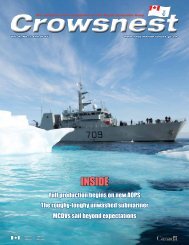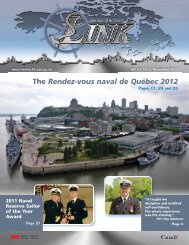Create successful ePaper yourself
Turn your PDF publications into a flip-book with our unique Google optimized e-Paper software.
impossible, <strong>and</strong> certainly not a short-term likelihood. <strong>The</strong> impact <strong>of</strong> <strong>the</strong> loss or reduction in<br />
availability <strong>of</strong> an important food source is already visible. In Sub-Saharan Africa, where food<br />
resources are not always adequate, fish consumption has begun to decline, placing greater stress<br />
on o<strong>the</strong>r (<strong>of</strong>ten strained) food resources. 65 Some commentators have even contended that <strong>the</strong>re<br />
could be a connection between overfishing <strong>and</strong> piracy. 66<br />
Magnifying <strong>the</strong> problem <strong>of</strong> over-fishing is “illegal, unreported <strong>and</strong> unregulated (IUU) fishing.” 67<br />
It was described in a report issued by <strong>the</strong> UN Secretary-General as “<strong>the</strong> main obstacle in<br />
achieving sustainable management <strong>of</strong> fishery resources.” 68 It is believed that <strong>the</strong> principal cause<br />
<strong>of</strong> IUU is pr<strong>of</strong>it, as IUU fishing “can lower administrative <strong>and</strong> operating costs, avoid paperwork,<br />
ignore quotas <strong>and</strong> still charge premiums from unknowing buyers (or, indeed, those who do not<br />
care to know).” Regardless <strong>of</strong> its cause, <strong>the</strong> scale <strong>of</strong> <strong>the</strong> problem is imposing. A study by <strong>the</strong><br />
Pew Charitable Trusts estimated that one-fifth <strong>of</strong> all fish sold in stores or restaurants, worth about<br />
US$23 billion annually, is caught illegally. It observed that, in some regions, <strong>the</strong> scale <strong>of</strong> illegal<br />
fish might reach as much as 40 percent <strong>of</strong> <strong>the</strong> total catch. 69 Not only does IUU fishing target wild<br />
stocks that are <strong>of</strong>ten already severely stressed but <strong>the</strong>re can be socio-economic implications.<br />
Local economies are harmed as income patterns are disrupted with coastal communities <strong>and</strong><br />
developing societies most at risk from foreign-based IUU fishing. In 2011, <strong>the</strong> Republic <strong>of</strong> Congo<br />
banned dozens <strong>of</strong> Chinese ships from its waters due to IUU activities; <strong>and</strong>, in 2013, a<br />
South Korean ship was denied access to a port due to evidence <strong>of</strong> IUU fishing <strong>of</strong> local tuna. 70 A<br />
significant challenge in confronting IUU fishing is that many international accords directed at <strong>the</strong><br />
problem, such as <strong>the</strong> FAO’s Port State Measures Agreement (2009), that its advocates believe<br />
will be both cost-effective <strong>and</strong> efficient, lack implementation strategies, policy <strong>and</strong> legal<br />
frameworks, <strong>and</strong> operational mechanisms. 71<br />
65 UNGA, Oceans <strong>and</strong> <strong>the</strong> law <strong>of</strong> <strong>the</strong> sea; Report <strong>of</strong> <strong>the</strong> Secretary-General, p. 9.<br />
66 See, for example, Ishaan Tharoor, “How Somalia’s Fishermen Became Pirates”, Time, 18 April 2009.<br />
<strong>The</strong> claim <strong>of</strong> a causal link is, however, disputed. Those who reject a direct linkage argue that, however<br />
desperate <strong>the</strong> plight <strong>of</strong> <strong>the</strong> fishing industry near <strong>the</strong> Horn <strong>of</strong> Africa <strong>and</strong> <strong>of</strong>f <strong>the</strong> coast <strong>of</strong> East Africa, <strong>the</strong><br />
majority <strong>of</strong> apprehended pirates have never been fishermen. Moreover, foreign fishing fleets targeted<br />
stocks that <strong>the</strong> locals seldom exploited. See Ghassan Schbley <strong>and</strong> William Rosenau, Piracy, Illegal Fishing<br />
<strong>and</strong> <strong>Maritime</strong> Insecurity in Somalia, Kenya <strong>and</strong> Tanzania, Center for <strong>Naval</strong> Analysis, November 2013 <strong>and</strong><br />
V<strong>and</strong>a Felbab-Brown, Evolution <strong>and</strong> Realities <strong>of</strong> Piracy <strong>and</strong> Illegal Fishing in African Gulfs (Brookings<br />
Institute: Washington, D.C., 9 December 2013).<br />
67 <strong>The</strong> phrase illegal, unreported <strong>and</strong> unregulated fishing is used by <strong>the</strong> UN, <strong>the</strong> FAO <strong>and</strong> <strong>the</strong> International<br />
<strong>Maritime</strong> Organisation. See Seokwoo Lee, Anastasia Telesetsky <strong>and</strong> Clive Sch<strong>of</strong>ield, “Slipping <strong>the</strong> Net:<br />
Why is it so Difficult to Crack Down on IUU Fishing?” in Nordquist et al., Freedom <strong>of</strong> Navigation <strong>and</strong><br />
Globalization, pp. 94–95.<br />
68 Quoted in Lee et al., “Slipping <strong>the</strong> Net: Why is it so Difficult to Crack Down on IUU Fishing?” in<br />
Nordquist et al., Freedom <strong>of</strong> Navigation <strong>and</strong> Globalization, p. 88.<br />
69 Pew Charitable Trusts, “Pew Unveils Pioneering Technology to Help End Illegal Fishing”, Press<br />
Release, 21 January 2015 [accessed on 26 February 2015 at www.pewtrusts.org/en/about/news-room/pressreleases/2015/01/21/pew-unveils-pioneering-technology-to-help-end-illegal-fishing].<br />
70 Lee et al., “Slipping <strong>the</strong> Net: Why is it so Difficult to Crack Down on IUU Fishing?” in Nordquist et al.,<br />
Freedom <strong>of</strong> Navigation <strong>and</strong> Globalization, pp. 91–93.<br />
71 FAO, State <strong>of</strong> <strong>the</strong> World Fisheries <strong>and</strong> Aquaculture <strong>and</strong> Progress in <strong>the</strong> implementation <strong>of</strong> <strong>the</strong> Code <strong>of</strong><br />
Conduct for Responsible Fisheries <strong>and</strong> Related Instruments, para 49. Interestingly, <strong>the</strong> Port State Measures<br />
Agreement had not yet become binding international law by late-2015.<br />
DRDC-RDDC-2016-R085 17




